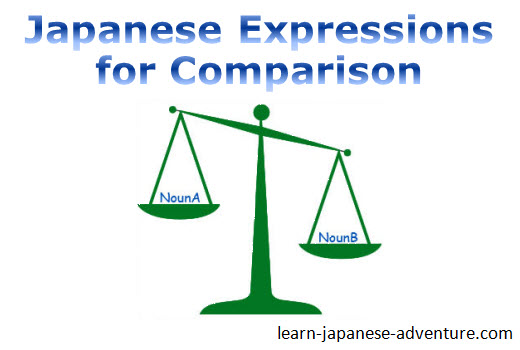- Home
- Intermediate Lessons
- Japanese Expressions for Comparison
Japanese Expressions for Comparison -
Intermediate Lessons: 21
You will learn what Japanese expressions to use when comparing two items in this lesson.

The items being compared can be people, things, places, time, etc.
Sentence Pattern
The first expression is to ask the comparing question. Let's see the sentence pattern...
| NounA と | NounB と | どちらが | Adjective ですか |
Meaning: Which is more Adjective? NounA or NounB?
To answer this question, you can use the following Japanese expression (sentence pattern)...
| (NounA より) | NounB (or NounA) のほうが | Adjective です |
Meaning: NounB (or NounA) is more Adjective.
The one in the bracket (NounA より) can be omitted.
Both the question and answer look simple, aren't they?
Let's practise with some examples...
|
1. |
北海道と大阪とどちらが暑いですか。 |
|
2. |
大阪のほうが暑いです。 |
|
3. |
新幹線と電車とどちらが高いですか。 |
|
4. |
新幹線のほうが高いです。 |
|
5. |
鈴木さんの鞄と山田さんの鞄とどちらが重いですか。 |
|
6. |
鈴木さんの鞄のほうが重いです。 |
|
7. |
アメリカと日本とどちらが大きいですか。 |
|
8. |
アメリカのほうが大きいです。 |
|
9. |
田中さんと高松さんとどちらが背が高いですか。 |
|
10. |
高松さんのほうが背が高いです。 |
|
11. |
ジョンさんとマイクさんとどちらがテニスが上手ですか。 |
|
12. |
マイクさんのほうがテニスが上手です。 |
|
13. |
肉と魚とどちらが好きですか。 |
|
14. |
肉のほうが好きです。 |
Another Japanese Expression on Comparison
There is one more Japanese expression which you can use to compare two items. The sentence pattern is as follow...
| NounA は | NounB より | Adjective です |
Meaning: NounA is more Adjective than NounB.
より (yori) here has the meaning of "than" or "as compared to". Therefore you can say "As compared to NounB, NounA is more Adjective".
For example...
|
1. |
日本はアメリカより小さいです。 |
|
2. |
山田さんの鞄は鈴木さんの鞄より軽いです。 |
|
3. |
電車は新幹線より安いです。 |
|
4. |
北海道は大阪より寒いです。 |
|
5. |
田中さんは高松さんより背が低いです。 |
|
6. |
ジョンさんはマイクさんよりテニスが下手です。 |
All the above Japanese expressions are commonly used in comparing two items.
Mystery Sales! Get 45% Forever OFF Premium & Premium PLUS! Ends on 20 Feb 2026
The link above is an affiliate link, which means that I would earn a commission (at no extra cost to you) if you do end up purchasing the related learning course.
Buy me a coffee








Facebook Comments
Don’t see the comments box? Log in to your Facebook account, give Facebook consent, then return to this page and refresh it.